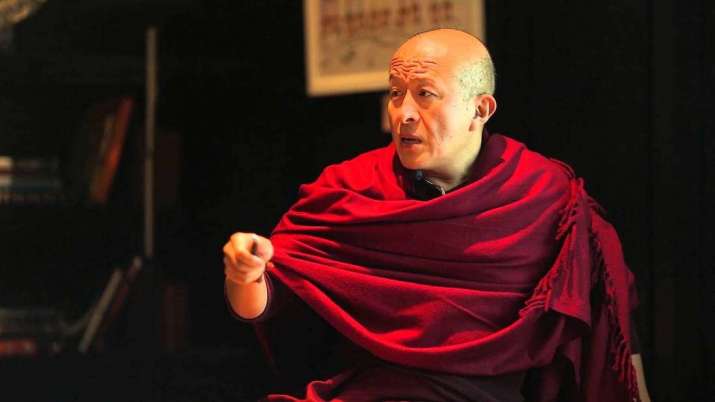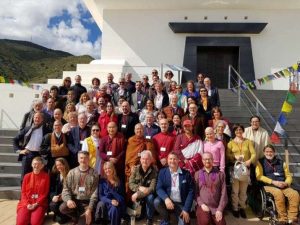
The Khyentse Foundation, founded by the renowned Bhutanese lama, filmmaker, and writer Dzongsar Jamyang Khyentse Rinpoche, has announced the undertaking of an ambitious new initiative to translate the Tibetan Buddhist canon of sutras and shastras into the Chinese language over the next 100 years—a task that Rinpoche views as the next major translation undertaking following his 84000 initiative launched in 2010.
“The Chinese Buddhist canon is another ancient collection of sutras and shastras of great importance to both Buddhists and scholars around the world,” the Khyentse Foundation said in an announcement on its website. “However, the Tibetan Buddhist canon contains a good number of precious sutras and shastras that are not present in Chinese because texts were translated into the two languages in different eras.”
In 2010, 84000—named for the number of teachings the Buddha is said to have given—began translating the words and teachings of the Buddha into modern languages with the aim of preserving the teachings and making them available to all, free of charge. According to 84000, only 5 per cent of the Buddha’s teachings had hitherto been translated into modern languages and due to the rapid decline in knowledge of classical Tibetan and in the number of qualified scholars, the world is in danger of losing this unique cultural and spiritual legacy. To date, 84000 has translated 8,546 pecha pages into English, with some 22,000 currently in progress.
“By translating and making available the Tibetan Buddhist texts to modern people, a vast swath of Buddhist civilization and culture may be saved from annihilation,” said Dzongsar Khyentse Rinpoche. (84000)

84000 is a long-term undertaking—aiming to translate 70,000 pages of the Kangyur (the translated words of the Buddha) in 25 years and 161,800 pages of the Tengyur (the translated commentaries on the teachings) in 100 years. The organization supports 38 teams of 201 translators from around the world, including Tibetan scholars and Western academics.
“Translating these Tibetan texts into Chinese has been the wish of Chinese-Tibetan translators for generations,” the Khyentse Foundation said. “From the Song dynasty in the 10th century to the Qing dynasty in the 19th century, translators have translated Tibetan Buddhist texts into Chinese, but the number of these translations remains limited. Dzongsar Khyentse Rinpoche has committed Khyentse Foundation to take on the grand mission of translating the Tibetan canon into Chinese, benefiting all Chinese-speaking practitioners. KF sees this as the next great translation project after 84000.”
The Khyentse Foundation launched a year-long pilot project to translate the Tibetan Buddhist texts into Chinese in 2017. Headed by Prof. Jin-Song Hsiao, the translation team achieved all of the pilot’s objectives, translating 18 sutras and one shastra—a total of 189 Tibetan pecha pages. The pilot project also revealed the shortage of adequately qualified Tibetan-Chinese translators and the urgent need to train Buddhist translators and establish translation teams in order to achieve the objective of translating all of the missing Tibetan Buddhist texts into Chinese in the next 100 years.
“The pilot translators were knowledgeable in Buddhist philosophy and fluent in both Chinese and Tibetan,” said the Khyentse Foundation. “In addition, Tibetan scholars ensured that the translation authentically expressed the Buddhist philosophy expounded in the original Tibetan texts. Chinese Buddhist scholars helped polish the final Chinese translation. Although the workflow is meticulous and extremely time consuming, we believe it is the only way to ensure that the translation of the Buddhist texts is as close to perfect as possible.”
The first phase of the Chinese translation project will focus on the exoteric section of the Kangyur not currently included in the Chinese Buddhist canon comprising some 5,162 pecha pages.
Founded in 2001, Khyentse Foundation is a nonprofit organization established by Rinpoche with the aim of promoting the Buddha’s teaching and supporting all traditions of Buddhist study and practice. The foundation’s activities include major text preservation and translation projects, support for monastic colleges in Asia, a worldwide scholarship and awards program, development of Buddhist studies at major universities, training and development for Buddhist teachers, and Buddhist education for children.

Born in Bhutan and now based in Himachal Pradesh, India, Dzongsar Khyentse Rinpoche gives teachings all over the world. He is the son of Thinley Norbu Rinpoche and was a close student of the Nyingma master Dilgo Khyentse Rinpoche (1910–91). He is recognized as the third incarnation of Jamyang Khyentse Wangpo (1820–92), founder of the Khyentse lineage, and the immediate incarnation of Jamyang Khyentse Chökyi Lodrö (1893–1959). In addition to Khyentse Foundation, his projects include 84000, a non-profit global initiative to translate the words of the Buddha and make them available to all; Siddhartha’s Intent, which organizes, distributes, and archives his teachings; Lotus Outreach, which directs a wide range of projects to help refugees; and more recently The Lhomon Society, which promotes sustainable development in Bhutan through education.
See more
Pioneering a Hundred-Year Mission (Khyenste Foundation)
84000: Translating the Words of the Buddha
The Activities of Dzongsar Jamyang Khyentse Rinpoche














